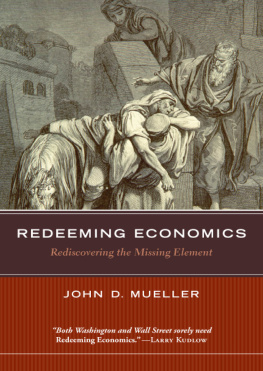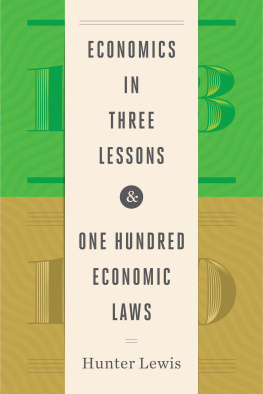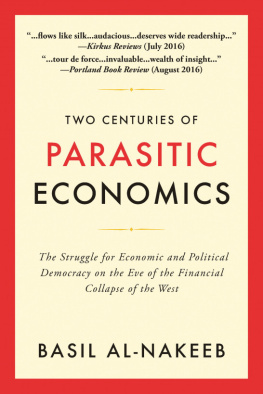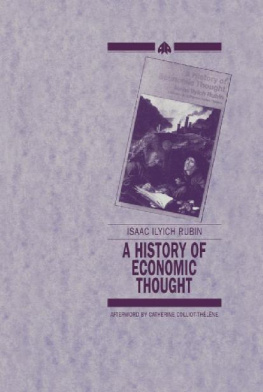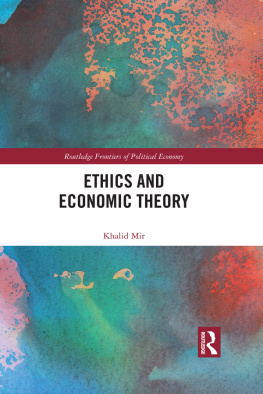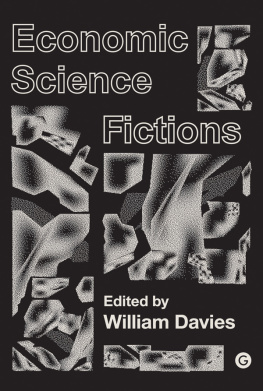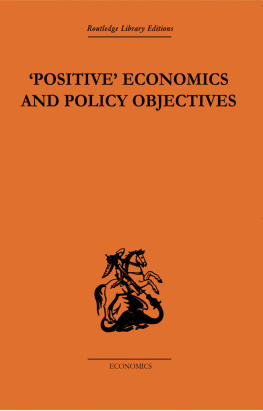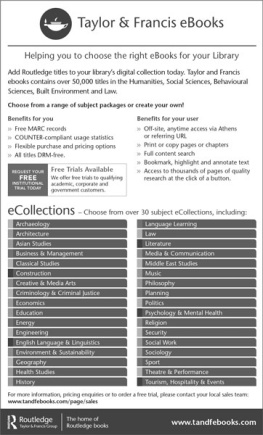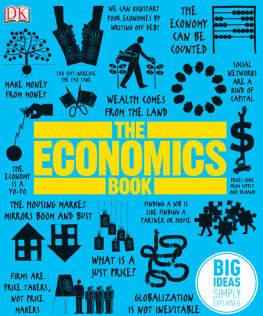All rights reserved, including without limitation the right to reproduce this ebook or any portion thereof in any form or by any means, whether electronic or mechanical, now known or hereinafter invented, without the express written permission of the publisher.
Copyright 2010 by John D. Mueller
and my friend Lewis E. Lehrman,
the evidence of things unseen (Hebrews 11:1).
INTRODUCTION
Rediscovering the Missing Element in Economics
T he thesis of this book is straightforward. The most important element in economics is missing, and its rediscovery is priming a revolution the likes of which has occurred only three times in more than 750 years.
The Scottish moral philosopher Adam Smith (1723-90) is frequently called the founder of economics. But in fact it was Smith who eliminated this pillar of economic thought. He rendered economic theory incomplete and made it incapable of describing human behavior.
The first revolution in economics had occurred five centuries before Smith, when Thomas Aquinas (122574) set forth the basic elements of economic theory. Synthesizing the work of Aristotle (384-322 B.C.) and Augustine of Hippo (A.D. 354-430), Aquinas offered a comprehensive view of human economic actions. All such actions fall into four categories: humans produce, exchange, distribute, and consume goods (human and nonhuman). Thus the theory Aquinas outlinedknown as Scholastic economicshad four key elements: the theory of production, which explains which goods (and how many of them) we produce; the theory of justice in exchange, which accounts for how we are compensated through the sale of goods for our contributing to their production; the theory of final distribution, which determines who will consume our goods; and finally, the theory of consumption (or utility), which explains which goods people prefer to consume.
Adam Smith sparked the second economic revolution when he drastically simplified the Scholastic economics he had been taught. He dropped not one but two elements of the four that Aquinas had outlined. He eliminated the Scholastic theories of consumption and final distribution, launching classical economics with production and exchange alone. At the same time, he claimed that Aristotle's theory of production could be pared to a single factor: labor.
Most complications in economics result from the fact that Smith's revision was an over simplification. In the 1870s, about a century after Smith's Wealth of Nations, neoclassical economists recognized shortcomings in Smith's theory. They led the third revolution in economics by restoring one of the elements Smith had dropped: Augustine's theory of utility, which describes consumption. But they did not reinstitute the other.
The fourth revolution is now upon us and will (I hope) finish what the last one started, by reintegrating the most important original element: the one that accounts for the social relationships that define us, the loves (and hates) that motivate and distinguish us as human beings. In trying to reduce human behavior to exchanges, modern economists have forgotten how these essential motivations are expressed, which is as personal or collective gifts (and their opposite, crimes). This book is an effort to outline what difference this makes, not only for economic theory but especially for its practical applications. Only by reintegrating this fourth element can we make economics whole again.
I'm quite fond of the old story about an economist who goes fishing with a Jewish rabbi, a Catholic priest, and a Protestant minister. After they've been sitting in the boat all morning, the rabbi says he thinks he'll stretch his legs, climbs out of the boat, and walks across the water to the shore. The priest and the minister then step out of the boat and walk across the water to join him. Though the economist has always been a skeptic, he resolves to make the leap of faith. He offers up a prayer, steps out of the boatand promptly sinks to the bottom of the lake. As he comes up sputtering, the rabbi turns to the others and says, Shall we tell him where the stepping-stones are?
The stepping-stones of economics are the four essential facets of all human economic decisions, which were integrated at all three levels of human society: personal, domestic, and political. Originally groundedin natural law philosophy, the stepping-stones are the facts of human existence explained with elements originally derived from Greco-Roman philosophy and the Bible. Smith, in effect, got rid of two of the stepping-stones, leaving economists at times to seem all wet.
Knowing the location of stepping-stones certainly doesn't make us smarter than anyone else. On the contrary, what is hidden from the learned and clever is often revealed to the merest children. Yet the knowledge can save a great deal of effort and lead us to search in places where we otherwise wouldn't. Like natural law philosophy itself, economic theory is the product of human reason reflecting on common human experience, and that is the approach followed throughout this book. But economic theory also has a peculiar relationship, both historically and logically, to biblical revelation. In that respect, it resembles modern cosmology, the theory of the origins and development of the universe.
The prevailing big bang theory might in principle have occurred to any physicist. And in the end it will be confirmed or disproved by instrument readings, not quotations from Genesis. But as a matter of historical fact, nearly all scientists in human history who considered the question, including Albert Einstein, began by merely assuming that the universe had always existed. The first physicist open-minded enough to consider that the universe had a beginning in time as an empirically testable hypothesis was a Belgian priest, Georges Lematre (18941966). (He was fortunate enough to learn a few months before his death that astronomers had detected the cosmic background radiation that seems to confirm his thesis.)
In the same way, a logically complete and empirically testable outline of economic theory might in principle have occurred to anyone. Only it didn't. History records that it occurred first to Aquinas, the most famous member of the Order of Preachers, who was trying to puzzle out exactly what is meant by Jesus's distillation of the Torah into the Two Great Commandments, to love God with all your heart and love your neighbor as yourself.
The peculiar relationship between natural law and biblically orthodox religious faith can be expressed by noting that economics is essentially a theory of providence. It mostly concerns human providence, describing how we provide for ourselves and the other persons we love, using Augustine explained why a correct understanding of the relation between human and divine providence is necessary for a correct understanding of economic activity evenor especiallywhen it contradicts moral or religious norms.

